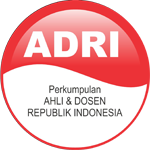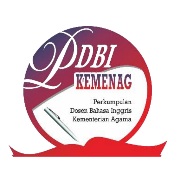The Impact Explorative Study of Teachers’ Perception on Online Learning Based on Technology Accepted Model
Abstract
This study aims to offer teachers' perspectives on the effects of integrating online learning, utilizing technology accepted models (TAM) by Davis, during the spread of the Corona virus. This study employed an exploratory case study to dig up further about English teachers’ perception toward online learning based on TAM. The participants consisted of 20 SMPN teachers to respond the questioner and 5 SMPN teachers to answer the interview in Jombang region, East java, Indonesia. The data were obtained from questionnaires and interviews developed based on TAM. All participants completed online research questionnaires with Google Form application. And was followed by interviews to support the finding from questionnaire. The results indicated that participants held a favorable opinion about the perceived utility, convenience of use, and behavioral intention of online learning systems. The majority of teachers agreed on online learning. Although the teachers faced multiple challenges when conducting online classes, they remained optimistic about utilizing technology for remote instruction.
Keywords
Full Text:
PDFReferences
Bao, W. (2020). COVID-19 and online teaching in higher education: A case study of Peking University. Pedagogical Research Journal, 5(4), 113–115. https://doi.org/10/1002/he2.191
BraisilaiG., & Kvavadze, D. (2020). Transition to online education in schools during a pandemic in Georgia. Pedagogical Research Journal , 5(4), 1–9. https://doi.org/10.29333/pr/7937
Basri, M.,& Paramma, M.A.(2019). EFL students’ perspective on the usefulness of ICT based learning in Indonesian higher education. ELT Worldwide Journal, 6(1), 22-32.
Bozkurt, A., Ozbek, E., Yilmazel, S., Erdogdu, E., Ucar, H., Guler, E., Sezgin, S., Karadeniz, A., Sen-Ersoy, N., Canbek, N., Dincer, G., Ari, S., & Hakan, C. (2020). A global outlook to the interruption of education due to COVID-19 Pandemic: Navigating in a time of uncertainty and crisis. Asian Journal of Distance Education, 15(1), 1-126.
Byun, S., & Slavin, R. E. (2020). Educational responses to the COVID-19 outbreak in South Korea. SSRN Electronic Journal.2(2), 16-26. https://doi.org/10.2139/ssm.3652607
Carrillo, C., & Flores, M. A. (2020). COVID-19 and teacher education: a literature review of online teaching and learning practices. European Journal of Teacher Education, 43(4), 466–487. https://doi.org/10.1080/02619768.2020.1821184
Cadamuro, A., Bisagno, E., Rubichi, S. & Rossi, L.(2021) Distance learning and teaching as a consequence ofThe Covid – 19 pandemic: a survey of teachers andStudents of an Italian high school taking into accountTechnological issues, attitudes and beliefs toward distance learning, metacognitive skills. Journal of e-learning and Knowledge Society, 17(1), 81-89.https://doi.org/10.20368/1971-8829/1135463
Davis, F. D. (1989), Perceived usefulness, perceived ease of use, and user acceptance of information technology, MIS Quarterly.
Davis, B., Carmean, C., & Wagner, E. (2009).The Evolution of the LMS : From Management to Learning.The ELearning Guide Research.
Giovannella, C. (2020). Measuring the effect of the Covid-19 pandemic on the Italian Learning Ecosystems at the steady state: a school teachers’ perspective. IJI Journal, 1( 23). p.122-132
Huang, R., Tlili, A., Chang, T. W., Zhang, X., Nascimbeni, F., & Burgos, D. (2020). Disrupted classes, undisrupted learning during COVID-19 outbreak in China: application of open educational practices and resources. Smart Learning Environments, 7(1), 23-37.https://doi.org/10.1186/s40561-020-0012-8
Hidayati, A.N., Abdullah, F., Sri, M.,Ramalia, T., Yunita, W. & Sulastri, F.(2022). Whatsapp in the Indonesian Online EFL Learning Milieu: How Do the Students Engage?.ENGLISH FRANCA: Academic Journal of English Language and Education, 6(1), 83-98 https://doi.org/10.29240/ef.v6i1.4136
K. Ansong-Gyimah (2020).Students’ perceptions and continuous intention to use e-learning systems: The case of Google Classroom. International Journal of Emerging Technologies in Learning (iJET), vol. 15, no. 11, pp. 236–244, 2020. https://doi.org/10.3991/ijet.v15i11.12683
Makhdum, F.N. & Khanam, A.(2021). Online classes during Covid-19 pandemic: preparedness and readiness of students and teachers in Pakistan with parents’ experiences. Journal of e-learning and Knowledge Society, 17(2), 9-20. https://doi.org/10.20368/1971
Martínez,F.,Jacinto,E.,&Montiel,H.(2021).The use of online learning environments in higher education as a response to the confinement caused by COVID- 19. Journal of e – Learning and Knowledge Society, 17 (1),10-17. https://doi.org/10.20368/1971-8829/1135309
Nambiar, D. (2020). The impact of online learning during COVID-19: students’ and teachers’ perspective. The International Journal of Indian Psychology, 8(2). https://doi.org/1 0.25215/0802.094
Purwanto, A., Pramono, R., Asbari, M., Santoso., P. B., Wijayanti, L. M., Hyun, C. C., et al. (2020). Studi eksploratif dampak pandemi COVID-19 terhadap proses pembelajaran online di sekolah dasar. Journal of Education, Psychology, and Counseling, 2, 1–9.
Rukmi, N., S., Novianti, H. & Rukminingsih.(2021). Students’ perceptions towards distance education with online collaborative platforms in EFL critical reading course. New Language Dimensions Journal, 2(1) , 102-115.
Rukminingsih & Rukmi, N.S. (2021)Students’ perceptions towards collaboration synchronous and asynchronous instruction for EFL learners’ reading course. Proceedings of the UNNES-TEFLIN National Seminar, 4 (1), 78-90.
Tarigan, S.L., Syafryadin, Sofyan, D.(2022). Challenges faced by English teachers in indragiri hulu regency in teaching speaking through online platform. ENGLISH FRANCA: Academic Journal of English Language and Education, 6 (1), 167-190. https://doi.org/10.29240/ef.v6i1.4106
Wiyaka, Mujiyanto, J., & Rukmini, D. (2018). Students’ perception on the usefulness of ICT-based language program. English Language Teaching Journal, 11(2), 53.
Verawa dina, U., & Jama, J. (2018). Philosophy TVET di era derupsi revolusi industri 4.0 di Indonesia. Jurnal Filsafat Indonesia, 1(3), 104–111.
Yin, R. K. (2014). Case study research: Design and methods (5th ed.). Thousand. Oaks, CA: SAGE Publications Inc.
DOI: http://dx.doi.org/10.29240/ef.v7i2.7201
Refbacks
- There are currently no refbacks.
Copyright (c) 2023 Rukminingsih Rukminingsih, Hartia Novianti, Kiritkumar Bhatt, Nala Sita Rukmi

This work is licensed under a Creative Commons Attribution-NonCommercial-ShareAlike 4.0 International License.
INDEXED BY:
 This work is licensed under a Creative Commons Attribution-NonCommercial-ShareAlike 4.0 International License
This work is licensed under a Creative Commons Attribution-NonCommercial-ShareAlike 4.0 International License
@ ENGLISH FRANCA : Academic Journal of English Language and Education
Jl. Dr. AK Gani No 1 Dusun Curup, Rejang Lebong Regency, Bengkulu Province, Indonesia, 39119.
Dr. Eka Apriani, M.Pd., email: efranca@iaincurup.ac.id, eka.apriani@iaincurup.ac.id.





.png)












